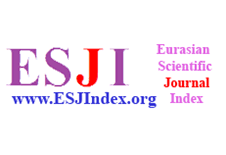CAUSAL RELATIONSHIPS AMONG ENERGY CONSUMPTION, CARBON DIOXIDE EMISSIONS, AND ECONOMIC GROWTH
Norbek Nurmatov
Senior teacher Termez State University Termez, Uzbekistan
Keywords: Causal relationships, Energy consumption, Carbon dioxide emissions, Economic growth, Econometric analysis, Sustainability
Abstract
Understanding the causal relationships among energy consumption, carbon dioxide (CO2) emissions, and economic growth is essential for informing sustainable development policies and addressing environmental challenges. This article conducts an econometric analysis to investigate the complex interplay between these variables. Drawing on a comprehensive dataset and employing advanced econometric techniques, the study explores the direction and strength of causal relationships, considering both short-term dynamics and long-term trends. The findings contribute to a deeper understanding of the intricate interactions between energy consumption, CO2 emissions, and economic growth, providing valuable insights for policymakers, researchers, and stakeholders in fostering environmentally sustainable economic development.
References
Allayarov, P. (2022). The factors affecting Kyrgyzstan's bilateral trade: a gravity-model approach. Архив научных исследований, 4(1).
International Energy Agency (IEA). (2021). World Energy Outlook 2021. Retrieved from https://www.iea.org/reports/world-energy-outlook-2021.
Intergovernmental Panel on Climate Change (IPCC). (2014). Climate Change 2014: Mitigation of Climate Change. Retrieved from https://www.ipcc.ch/report/ar5/wg3.
United Nations Framework Convention on Climate Change (UNFCCC). (2021). The Paris Agreement. Retrieved from https://unfccc.int/process-and-meetings/the-paris-agreement/the-paris-agreement.
Grossman, G. M., & Krueger, A. B. (1995). Economic growth and the environment. The Quarterly Journal of Economics, 110(2), 353-377.
Stern, D. I. (2000). A multivariate cointegration analysis of the role of energy in the US macroeconomy. Energy Economics, 22(2), 267-283.
Aslan, A., & Destek, M. A. (2017). Renewable and non-renewable energy consumption and economic growth nexus: Evidence from panel data for low and middle-income countries. Energy Policy, 107, 698-711.
Wagner, M., & Timilsina, G. R. (2012). How important are energy prices in affecting CO2 emissions? Evidence from a global VAR approach. Energy Economics, 34(2), 350-357.
Lee, C. C., & Chang, C. P. (2008). Energy consumption and GDP revisited: A panel analysis of developed and developing countries. Energy Economics, 30(6), 2372-2382.
Wolde-Rufael, Y. (2009). Energy consumption and economic growth: The experience of African countries revisited. Energy Economics, 31(2), 217-224.
Apergis, N., & Payne, J. E. (2010). Renewable energy consumption and economic growth: Evidence from a panel of OECD countries. Energy policy, 38(1), 656-660.
Enders, W. (2015). Applied Econometric Time Series. John Wiley & Sons.
Granger, C. W. (1969). Investigating causal relations by econometric models and cross-spectral methods. Econometrica: Journal of the Econometric Society, 37(3), 424-438.
Baltagi, B. H. (2008). Econometric analysis of panel data. John Wiley & Sons.
United Nations. (2015). Transforming our world: The 2030 Agenda for Sustainable Development. Retrieved from https://sdgs.un.org/2030agenda.
International Renewable Energy Agency (IRENA). (2021). World Energy Transitions Outlook. Retrieved from https://www.irena.org/publications/2021/Mar/World-Energy-Transitions-Outlook.
World Bank. (2021). State and trends of carbon pricing. Retrieved from https://openknowledge.worldbank.org/handle/10986/35079.
Stern, D. I. (2004). The rise and fall of the environmental Kuznets curve. World development, 32(8), 1419-1439.
Norbeck, N. (2022). PRIORITY DIRECTIONS OF USE OF DIGITAL TECHNOLOGIES IN THE AGRICULTURAL FIELD. Archive of Science, 2(1).
Jorayevich, N. N. (2022). PRIORITY DIRECTIONS OF DIGITALIZATION IN THE AGRICULTURAL NETWORK. Archive of Science, 5(5)
Nurmatov, N. (2022). POSSIBILITIES OF IMPLEMENTING THE CONCEPT OF "AGRICULTURE-4, 0" INTO THE AGRICULTURAL NETWORK OF OUR COUNTRY. Archive of Science, 2(1).
Nurmatov, N. (2022). POSSIBILITIES OF IMPLEMENTING THE CONCEPT OF "AGRICULTURE-4, 0" INTO THE AGRICULTURAL NETWORK OF OUR COUNTRY. Archive of Science, 2(1).

















